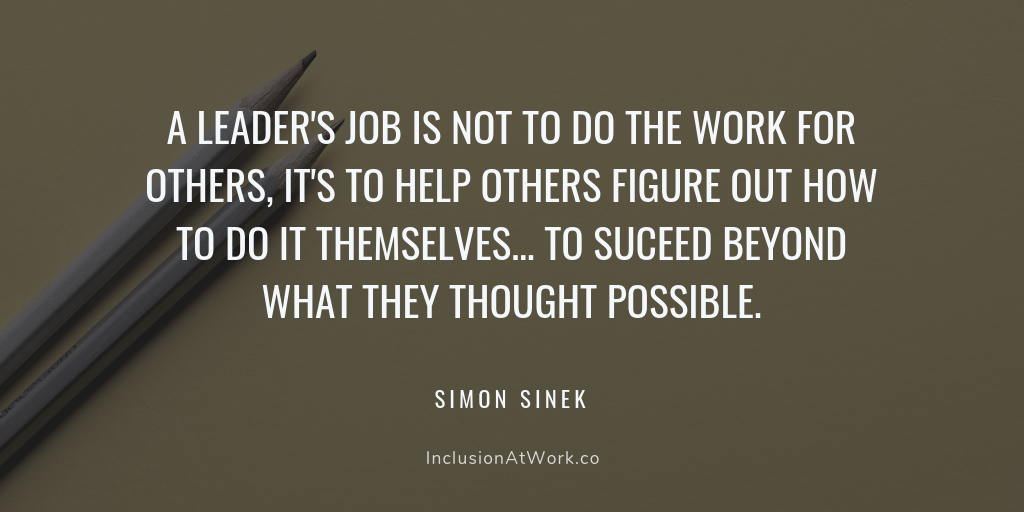The hidden meaning behind candidates’ questions
"How do I address tricky Qs from underrepresented candidates that I'm trying to hire?"

Submit your own question about Diversity & Inclusion here and subscribe to weekly posts here!
∗ ∗ ∗
Dear Inclusion At Work,
My startup is a tight-knit team of 12 that really values culture and D&I. Even though we’re not as diverse as we’d like to be, we’re actively working on it. But as a white male founder, there’s one thing that I genuinely don’t know how to handle.
There’s been a lot of women in our pipeline lately, but I find it harder to close them compared to male candidates. I’m sure there are many reasons, but I did notice a pattern: Every single woman I’ve interviewed asks about mentorship, and I don’t really know how to answer this. 1) How do I provide mentorship at our size and 2) how do I show that commitment?
-Wannabe Mentor
Dear Wannabe Mentor,
The good news is, that some things must be going well for your team, since “a lot of women” are at least entering your hiring process. That’s great! Far better than many other startups. If you haven’t already, I’d do some digging to figure out why this is happening, so you can build upon it.
But of course, it doesn’t matter how diverse your pipeline is, if no underrepresented minorities (URMs) are actually getting hired.
Let’s unpack why candidates ask questions during the hiring process at all. Interviewing is always a two-way street, and women and other URMs are especially careful in evaluating you – as a potential boss, and as a workplace. And rightly so! Candidates from underrepresented backgrounds are more likely to have been burned by previous companies due to bias, harassment, and toxicity. They have to ask a lot of questions to determine whether a startup will be a safe, supportive environment, or yet another dumpster fire.
Specifically, when it comes to questions about mentorship, there are actually a few possibilities for the underlying need that’s being communicated – individual growth, feedback, level of structure available, etc. But it can be difficult to articulate these kind of needs outright. So in interviews, we all use proxies. It’s your job then to get curious about what they’re really asking about.
The next time a candidate asks about mentorship, say that you’re happy to answer, but you’d like to further understand their reasoning behind the question. Talk it out together. They might have an answer ready to go about the value of previous mentors, or they might realize they don’t actually have any specifics in mind.
With a better understanding of what they’re looking for, you can then ground your answers around that. Mentorship, or being “supervised” by a more senior person is certainly one way to learn. But you can explain that sometimes, the greatest growth comes from doing. Having a safe space to stretch, try new things before you feel fully “trained” or “qualified." You might fail, but a supportive, scrappy team is there pick you back up because that’s the nature of early-stage startups – you’re all figuring it out together.
THAT is what a tight-knit, growth-oriented 12-person team can offer. The truth is, your team probably won’t have any formal mentoring relationships for awhile. But talk through what that means, and whether the tradeoffs make sense for the candidate. Very few founders can open the dialogue and show genuine curiosity about people they’re trying to hire – who are as people and what they value. For some candidates – for the right ones – this kind of honesty and leadership from a founder is far more appealing than a vague promise for mentorship.
And maybe it turns out, a startup is not the right place for a particular candidate, and that’s okay too. This is an opportunity to understand more about what the person wants/needs in order to be successful.
Put another way, I encourage you to not accept candidates’ questions at face value. Figure out their intentions and underlying needs, and help frame the conversation around your team’s unique strengths and advantages. Otherwise, you default to defending against the fancy programs and unrealistic expectations set by your much-larger competitors. To win great candidates, play on your turf, not AppAmaGooBookSoft's.

One last thing, Wannabe Mentor. As I mention in almost every column, being mindful about D&I will only help you build a stronger company in general. It’s not just URMs that are carefully evaluating you and asking questions in proxy. By learning to be curious and not take questions from candidates at face value, you’re actually improving your own ability to close the right people.
So even if it’s a challenge, being able to invest in better hiring now as a 12-person team gives you so many advantages. I promise that these foundations will help you so much, in working towards a workplace that’s inclusive and fulfilling for all.
Thanks to my editor Bukky Adebayo, who learns by doing with me :)
Image by Rachel Pfuetzner on Unsplash

